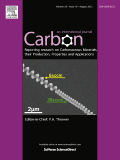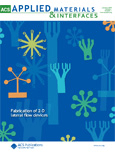
CARBON
metrics 2024
Fostering Excellence in Carbon Research
Introduction
CARBON is a leading peer-reviewed journal published by PERGAMON-ELSEVIER SCIENCE LTD, focusing on the realms of Chemistry and Materials Science. With an impressive impact factor, CARBON is ranked within the top quartile (Q1) of both fields in the 2023 Scimago Journal Rank, remarkably securing the 18th position out of 463 in General Materials Science and the 22nd position out of 408 in General Chemistry. Since its inception in 1963, the journal has been dedicated to publishing high-quality research that advances the understanding of carbon-based materials and their applications. Operating from the United Kingdom, CARBON provides an essential platform for researchers, professionals, and students alike to disseminate their findings and innovations. Although not an open-access journal, it offers access options that maintain the integrity and high standards of academic publishing. As a critical resource in its field, CARBON continues to foster scientific dialogue and development, significantly impacting current and future research.
Metrics 2024
 2.17
2.17 10.50
10.50 9.20
9.20 328
328Metrics History
Rank 2024
Scopus
IF (Web Of Science)
JCI (Web Of Science)
Quartile History
Similar Journals

Energy Material Advances
Transforming Ideas into Energy BreakthroughsEnergy Material Advances, published by the American Association for the Advancement of Science, stands at the forefront of energy research, showcasing groundbreaking studies in the realm of renewable energy, fuel technology, and materials science. With the journal's commitment to open access since 2020, it aims to democratize knowledge and foster innovation across a global community of researchers, professionals, and students. The journal boasts an impressive impact factor, placing it firmly within the Q1 category across multiple disciplines including Energy (miscellaneous), Fuel Technology, and Renewable Energy, Sustainability and the Environment, highlighting its significance in advancing scholarly discussions. In the latest Scopus rankings, Energy Material Advances ranks among the top 10% of journals in its field, affirming its role as a pivotal resource for current and emerging trends in energy materials. The journal is dedicated to facilitating collaborative efforts and inspiring novel approaches to the challenges posed by energy sustainability and technological advancement.

Frontiers in Energy
Igniting Innovation in Energy Engineering and Power Technology.Frontiers in Energy is a distinguished journal published by HIGHER EDUCATION PRESS, focusing on the dynamic and rapidly evolving field of energy engineering and power technology. Established in 2011, the journal serves as a pivotal platform for disseminating innovative research findings and practical applications that address critical challenges in energy systems. With an impressive Q2 ranking in 2023 and a Scopus rank of 81 out of 272 in the discipline, it highlights the journal's influential impact within the academic community, reflecting its commitment to high-quality research. Based in Beijing, China, the journal aims to promote open and accessible scientific discussion, facilitating collaboration among researchers, professionals, and students alike. As an open access publication, Frontiers in Energy ensures that valuable knowledge is readily available to a global audience, effectively contributing to advancements in sustainable energy solutions. Join the forefront of energy innovation by engaging with cutting-edge research that shapes our energy future.

ACS Applied Materials & Interfaces
Elevating Knowledge in Materials Science and NanotechnologyACS Applied Materials & Interfaces, published by the American Chemical Society, stands as a leading journal in the field of applied materials, nanotechnology, and interdisciplinary research in medicine. With an impressive Impact Factor that places it in the Q1 category across Materials Science, Medicine, and Nanoscience and Nanotechnology, this journal consistently ranks among the top tier, evidencing its significance and influence in advancing scientific knowledge. The journal’s scopus ranking of 33 out of 463 in General Materials Science further underscores its critical role in disseminating innovative and high-quality research. Although it is not an open-access journal, a diverse range of access options is available, ensuring that vital research findings are accessible to a broad audience of researchers, professionals, and students. Targeting breakthroughs in the synthesis, characterization, and application of materials and interfaces, ACS Applied Materials & Interfaces serves as a pivotal platform for publishing cutting-edge studies essential for future technological advancements.

Carbon Capture Science & Technology
Driving Innovation: The Premier Journal for Carbon Capture ResearchCarbon Capture Science & Technology, published by Elsevier, is an esteemed, peer-reviewed, open access journal dedicated to advancing research in the growing fields of chemical engineering, energy, and environmental science. With an ISSN of 2772-6568, this influential journal has established itself since its inception in 2021 and continues to make notable contributions, reflected in its impressive Q1 rankings across multiple categories, including a #14 rank in Environmental Science and a #13 rank in Chemical Engineering as of 2023. The journal aims to provide a platform for the dissemination of innovative carbon capture technologies and methodologies that address vital climate challenges, ensuring broad accessibility for researchers, professionals, and students alike. By embracing open access, Carbon Capture Science & Technology fosters a collaborative approach to knowledge sharing, making it an indispensable resource for those committed to sustainability and environmental preservation.

Geomechanics for Energy and the Environment
Transforming Geotechnical Engineering for a Greener TomorrowGeomechanics for Energy and the Environment, published by ELSEVIER, stands as a premier journal in the fields of geotechnical engineering, Earth sciences, and risk assessment. With an impressive impact factor and ranking in the Q1 category across multiple relevant disciplines including Computers in Earth Sciences and Engineering Geology, this journal serves as a critical platform for groundbreaking research and innovation from 2015 to 2024. Located in the Netherlands, it aims to bridge the gap between geomechanics and energy solutions, making it indispensable for professionals and academics focused on sustainability and environmental impacts. Although it operates on a traditional access model, the rich and varied content published in this journal is essential for those at the forefront of research, helping to foster a deeper understanding of the interplay between geomechanical processes and environmental challenges. Your contributions to this journal not only enhance scientific dialogue but also pave the way for advancements in risk management and geotechnical practices that are crucial for the future.

Membranes
Unleashing the potential of membranes in diverse disciplines.Membranes, published by MDPI since 2011, is an esteemed open access journal dedicated to advancing the field of membrane science and technology. With an E-ISSN of 2077-0375, this journal serves as a vital platform for researchers and professionals from various disciplines such as chemical engineering, filtration, and separation technologies. Holding a commendable Q2 ranking in Chemical Engineering (miscellaneous) and notable placement in filtration and process chemistry categories, it provides a robust framework for researchers to disseminate groundbreaking findings. The journal's commitment to open access ensures a wide-reaching impact, allowing for unrestricted sharing of high-quality research that addresses the critical challenges and innovations in membrane technology. Situated in Switzerland, Membranes is not only a cornerstone for academic inquiry but also a leading resource for students and industry experts seeking cutting-edge developments in their fields.

Carbon Trends
Advancing the Future of Carbon ResearchCarbon Trends is a cutting-edge, openly accessible journal published by ELSEVIER, dedicated to advancing research and discussion in the domains of Chemistry, Materials Chemistry, and Materials Science. Established in 2020, this journal has quickly become a pivotal platform for scientists and researchers to share innovative findings related to carbon materials and their applications. With a solid impact factor and a ranking in the second quartile (Q2) across multiple subject categories, including a percentile standing in the top two-thirds of global publications, Carbon Trends plays an essential role in shaping the future of materials science. The journal’s open access model ensures that valuable research is accessible to a broad audience, facilitating collaboration and knowledge dissemination. Researchers, professionals, and students alike will benefit from the insights and trends published within its pages, guiding them in the rapidly evolving field of carbon sciences.

Carbon Letters
Exploring the Future of Carbon Science.Carbon Letters, published by SPRINGER JAPAN KK, is a premier academic journal based in Singapore that focuses on groundbreaking research in the fields of Ceramics and Composites, Energy Engineering, Inorganic Chemistry, Materials Chemistry, and Organic Chemistry. With an exceptional reputation reflected in its 2023 category quartiles, which include Q1 rankings across multiple disciplines, this journal serves as a vital resource for researchers and professionals seeking to stay at the forefront of carbon-related studies and applications. Although it is not an open access publication, Carbon Letters facilitates the dissemination of high-quality research addressing contemporary challenges in renewable energy, sustainability, and environmental engineering, supporting the academic community's efforts in advancing science and technology. The journal has a robust converged period from 2014 to 2024, signaling its ongoing commitment to excellence in academia.

MRS Communications
Fostering innovation in the world of materials science.MRS Communications is a prominent academic journal published by Springer Heidelberg, focusing on the multidisciplinary field of materials science. With ISSN 2159-6859 and E-ISSN 2159-6867, this journal has been a valuable platform for disseminating cutting-edge research since its inception in 2011. Operating from its esteemed headquarters in Heidelberg, Germany, it aims to foster collaboration and innovation among researchers and practitioners by publishing high-quality, peer-reviewed articles. Holding a Q3 ranking in the Materials Science (Miscellaneous) category, and currently positioned at the 37th percentile in the general materials science field, MRS Communications is dedicated to advancing the understanding of materials through interdisciplinary studies. The journal offers researchers an opportunity to share insights that bridge theoretical knowledge with practical applications, contributing significantly to the global materials science community. As an essential resource for researchers, professionals, and students alike, we invite you to explore the latest advancements and discussions in materials science through this influential publication.

Boletin del grupo espanol del carbon
Elevating Knowledge in Carbon TechnologiesBoletin del Grupo Español del Carbon, a pivotal journal in the field of carbon science, is published by the Grupo Español Carbon and serves as a significant platform for disseminating research related to carbon materials, their applications, and advancements in carbon technology. With an ISSN of 2172-6094, this journal aims to bridge the gap between academia and industry by featuring original research articles, reviews, and noteworthy contributions from specialists in the sector. Though currently not designated as Open Access, the journal's commitment to quality ensures that the articles are available through various academic databases, enhancing accessibility for researchers, professionals, and students alike. Located in Zaragoza, Spain, at the prestigious Instituto Carboquímica, the journal endorses rigorous peer review and strives to foster international collaboration within the carbon research community. By maintaining high academic standards, Boletin del Grupo Español del Carbon aspires to impact the fields of materials science and environmental sustainability significantly.